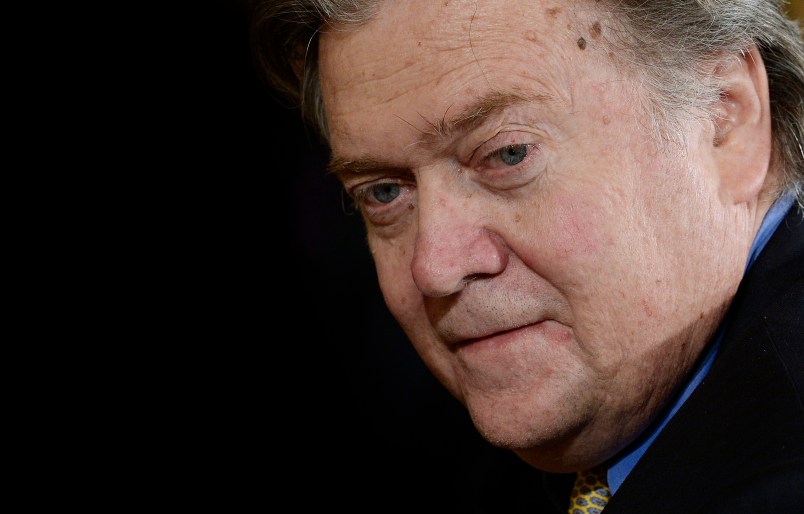White House chief strategist Steve Bannon will end his tenure in the White House on Friday. The hard-driving, media-savvy former Breitbart News executive shaped what he called Donald Trump’s “economic nationalism.” Critics, pointing Trump’s nativism and blunt appeals to Americans’ anxieties about national identity, called it racism.
Here are some of Bannon’s defining moments over the past year:
‘We’re the platform for the alt-right’
So went Bannon’s boast to Mother Jones last July, while he was still at Breitbart, shortly before he became Trump’s campaign CEO.
It was at once an honest and damaging assessment. The “alt-right” had by that time become known as a loose band of internet-savvy misogynists and white supremacists — the Associated Press discouraged the term’s use in a November memo, saying it “may exist primarily as a public-relations device” to disguise unpalatable beliefs — and Bannon was correct in saying Breitbart played to the audience.
With sub-sections like “Black Crime” and frequent, dramatic reports of crimes committed by undocumented immigrants and Muslims, Breitbart made its name as a home for xenophobia, and its comment sections still bear an uncanny resemblance to the speeches Bannon helped Trump write.
‘Satan. That’s Power.’
After a long career in conservative media, including with the production company Glittering Steel, Bannon seemed to understand the power of flipping the boogeyman image Democrats had assigned him during the presidential campaign.
In an interview with the Hollywood Reporter days after the 2016 election, he said: “Dick Cheney. Darth Vader. Satan. That’s power. It only helps us when they get it wrong. When they’re blind to who we are and what we’re doing.”
“I’m not a white nationalist, I’m a nationalist. I’m an economic nationalist,” Bannon added, a distinction he would continue to make during his time at the White House.
Bannon also pushed a “populist” economic platform in the interview, though there has been little evidence of his success on that front. “It’s everything related to jobs,” he said. “The conservatives are going to go crazy. I’m the guy pushing a trillion-dollar infrastructure plan.”
‘Deconstruction of the administrative state’
In what appeared to be an attempt to convince skeptics that Bannon and establishment Republican Reince Priebus — then White House chief of staff — could work together, the pair appeared together in a joint interview in front of a packed crowd at CPAC in February.
Bannon said he broke his priorities down into “three verticals”: National security, “economic nationalism” and the “deconstruction of the administrative state.”
“If you look at these Cabinet appointees, they were selected for a reason, and that is the deconstruction,” he continued, speaking to the third point. “The way the progressive left runs is if they can’t get it passed, they’re just going to put it in some kind of regulation in an agency. That’s all going to be deconstructed.”
On this point, Bannon may have left his deepest mark on the executive branch. Across government, Trump’s Cabinet appointments have carried out aggressive and all-encompassing attempts at deregulation, or “deconstruction.” As Bannon leaves the White House, huge chunks of the federal government bear the marks of his efforts.
The Big Whiteboard
In May, Bannon posed for pictures with rabbi and Breitbart contributor Shmuley Boteach, who later posted them online. In the background, a crowded whiteboard showed Bannon’s apparent bullet points for the Trump administration. “Cancel all federal funding to sanctuary cities,” read one, though that effort was blocked by a federal judge.
“Suspend immigration from terror-prone regions,” read another, “suspend the Syrian refugee program.” Bannon and senior adviser Stephen Miller were reportedly architects of Trump’s travel ban on seven Muslim-majority countries, which faced legal hurdles almost immediately.
‘The left wants to say it’s all racist’
In a series of surprisingly candid interviews and statements, Bannon warned Democrats against accusing Trump of racism, saying it would benefit Republicans. Bannon also said the effort to remove Confederate statues would backfire. He was reportedly “thrilled” and “proud” after Trump’s comparison of white supremacists to counter-protesters in Charlottesville, Virginia.
“This past election, the Democrats used every personal attack, including charges of racism, against President Trump,” he told the Washington Post on Thursday. “He then won a landslide victory on a straightforward platform of economic nationalism.”
“The race-identity politics of the left wants to say it’s all racist,” he told the New York Times earlier this week. “Just give me more. Tear down more statues. Say the revolution is coming. I can’t get enough of it.”







The left wants to say it´s racist, because it really is.
Even Mitt Romney things it is, and last time I checked…
Trump doesn’t need an Alt. right nexus after Tuesdays performance.
Trump’s worst week hasn’t even happened yet.
His only really GOOD week was the one just before his inauguration… all the rest, even throughout his campaign, right up to the convention and afterwards, were marked with abject failure of some recognizable sort… think I’m joshin’?
Go look…
so much winning…
The only thing he won was the election, everything else has been one form of losing or another.
Bannon’s out? I did nazi that coming…